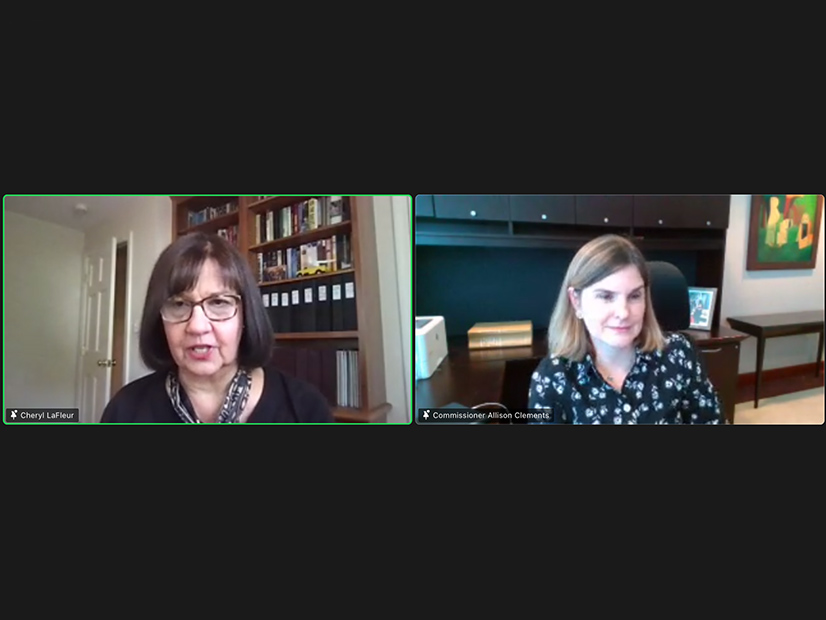
During her time at FERC, Cheryl LaFleur said, one thing that surprised her was the feeling of independence.
“I guess, theoretically, President Obama was my boss, but he sure never called,” joked LaFleur, who served as both a commissioner and chair at various times from 2010 to 2019.
Commissioner Allison Clements has been at FERC since December 2020 and was sworn in amid the COVID-19 pandemic. “I started coming into the office despite the fact that the commission isn’t open yet because I felt like I am playing commissioner on Zoom, and I need to go in and see if this card to get me in the door works,” Clements said.
LaFleur and Clements spoke Tuesday at the annual joint event between the Connecticut Power & Energy Society and New England Women in Energy and the Environment, sharing their observations and perspectives during a wide-ranging discussion.
LaFleur, currently on the ISO-NE Board of Directors, said there was “big excitement” last week when President Biden announced his intention to nominate D.C. Public Service Commission Chair Willie Phillips to FERC. Phillips, a Democrat, would fill the seat most recently held by Republican Neil Chatterjee and give the commission a Democratic majority. (See Biden to Nominate Phillips to FERC.)
Phillips is an experienced regulator “used to balancing different perspectives and reaching consensus,” according to LaFleur.
Clements said that with Chatterjee’s departure Aug. 30, “we were already starting to bite our nails a little bit, given the slate of technical conferences and the Advanced Notice of Proposed Rulemaking on transmission planning, cost allocation and generator interconnection (RM21-17). (See FERC Goes Back to the Drawing Board on Tx Planning, Cost Allocation.)
Phillips restoring “a full complement of people who start collaborating with each other … that’s exciting,” Clements said.
The density of technical conferences on the calendar was particularly interesting to LaFleur because the commission is “building records” to tackle various issues. Clements said that before joining FERC, she would not have linked technical conferences to “record building.” However, she added that there have been a high number of them, so much so that her 6-year-old daughter has technical conferences as “part of her vernacular, which cracks me up every time.”
“There is a recognition that we’re going to be at five [commissioners], and there’s a lot of things that need to get done,” Clements said. “Every one of these technical conferences is on a topic that you can spend a lot of time thinking about and prioritizing.”
In terms of regulatory philosophy, LaFleur said that because she had never been a regulator before her appointment to the commission, there was a line to walk between trying to do too much and taking a more measured approach to gain acceptance from the regulated community. LaFleur asked Clements about the tradeoffs between bold action versus incremental steps in the present regulatory landscape.
Clements said there are two “driving facts” that underscore her thinking most of the time. One is the increasing intensity, duration and frequency of extreme weather events wreaking havoc on the power grid, “causing catastrophe for people who are left without power.”
The other fact is climate change is real.
“Now, I should maybe start with that fact since it’s a precursor to the increasing extreme weather events, but we shouldn’t be afraid to think about climate change as a scientific fact that implicates as an input into our decision-making process,” Clements said.


